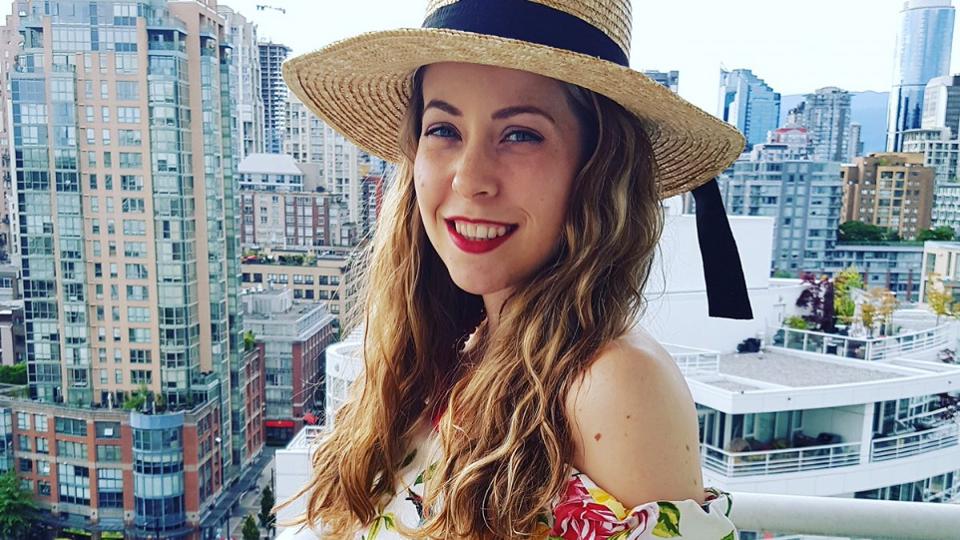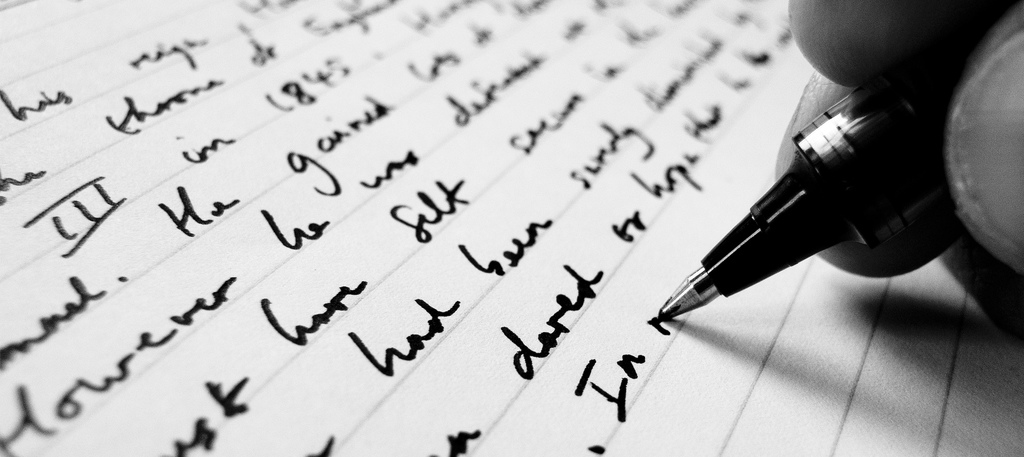Why It’s Okay If You Haven’t Finished Your First Book Yet
By A.H. Reaume
I thought I would finish my first novel by the time I turned 25.
I laugh at the absurdity of that now. But in my early 20s, I believed it when people told me that anything was possible with hard work and determination. I actually thought life worked like a shmaltzy motivational poster--the type you see in car dealerships behind the desk of that slick salesman who used to run track and now spends his days trying to upsell people on heated seats. Go confidently in the direction of your dreams! Live the life you’ve imagined!
I didn’t finish my first book by the time I was 25. Instead, I became (justifiably) angry about misogyny and started a non-profit to get young women involved in politics and feminist activism. It wasn’t that I had nothing to show for those 25 years, but my unfinished novel shadowed everything I did. It loomed over me even as I accepted awards for my work. You are living the wrong life, it whispered.
When I burned out a year later after volunteering for one too many feminist causes, I decided to transform my life. I set my sights on 30 as the magic date by which I would finally finish my book. At the time, I was working on a draft of a novel responding to Arthur Miller’s Death of a Salesman that explored the contemporary meaning of ‘tragedy.’ If I only worked part-time, I would have more than enough time to finish it.
But life had other plans for me.
Maybe life also had other plans for you. Maybe you wanted to write, but something got in your way. Maybe that thing took over your life. Maybe it kept you so busy trying to deal with it that you didn’t have the time or the energy to work on your poetry or your fiction or your memoir.
In my case, my boyfriend Gio came home one day to tell me that he’d been laid off.
“We’ll figure it out,” I told him, instinctively putting my hand on his arm to comfort him. “It’ll be okay.”
“No. It won’t,” he said quietly, and pulled away.
Gio and I had been dating for three years. He was the type of man who left Post-It notes all over his apartment telling me, in precise detail, how much he loved me. Who made sure I had a glass of water next to the bed every night since he couldn’t stand the thought that I might wake up thirsty. Most weekends, I’d write and he’d paint, and then we would take breaks to go for a walk or watch foreign films together. We were a boring couple, but we liked it that way.
Your CanLit News
Subscribe to Open Book’s newsletter to get local book events, literary content, writing tips, and more in your inbox
This wasn’t the first time Gio had been laid off. The last time it happened it took him two years to find another job and he’d had to declare bankruptcy. He’d almost killed himself, he told me a month into our relationship.
I locked that knowledge away. He couldn’t get that low again, I told myself. But it was all I could think about as we spent the evening calculating how long the money in Gio’s bank account would last. I suggested we move in together to cut costs.
“I will kill myself if I end up in the same place I was last time,” he whispered later that night as we lay in bed. “I can’t lose everything again.”
“I won’t let that happen,” I whispered back, trying to sound more confident than I was. I rolled over and held him while he lay stiff and silent. I didn’t sleep that night.
The next day, I started looking for a full-time job. I found one a few weeks later, and Gio and I settled into an apartment closer to my new office. Gio spent all his time applying for jobs and I spent all my time helping him search through postings. I didn’t think about my novel at all.
Months went by. They slowly stacked on top of each other until they added up to a year.
Gio began talking almost exclusively about suicide and we desperately searched for things that would help make him want to live. We tried SAD lights, anti-depressants, expensive supplements, a career counsellor. We spent $1,600 on therapy in one month alone. All of these things cost money that we didn’t have.
To pay for it, Gio started a product review blog and I started freelancing. I wrote content marketing articles for corporate websites and ghostwrote for the CEOs of startups.
I was working eight hours at my day job, and then coming home and writing about how to pay off your student loans or improve your credit score for several hours more. At the end of the day, I would collapse next to Gio, exhausted, and spend the rest of the night trying to convince him that he was wrong in thinking that his only option was to end his life, and that it wasn’t true that he was a burden. Every night, he was unsure if he could continue. Every night, I pleaded with him to keep going.
Around that time, I started crying regularly in the shower so Gio wouldn’t hear me. I still wasn’t working on my novel. A character killed themselves at the end and I decided I couldn’t face revising the book anymore.
Instead, I sat in the armchair I worked in, writing articles about couples who paid off thousands of dollars of debt in X months and how-to pieces about refinancing auto loans until I wore a groove into the seat so deep that we had to replace it. But I wrote. I wrote in fear. I wrote with hope. I wrote glancing out of the corner of my eye at Gio to make sure he was okay. I wrote while crying, terrified that Gio had jumped off a bridge somewhere because he had left the house upset and wasn’t texting me back. When a year later we moved close enough that I could walk to work, I wrote while walking--dictating drafts of articles using voice-to-text.
I wrote the day after I had to call 911 and have the cops take Gio to get evaluated for a psychiatric hold. I even wrote the night after I wrenched a knife out of Gio’s hands as he held it to his throat. I had to. The money I made from my writing was keeping him alive.
Around that time, Gio started talking about selling his car—the last valuable thing he owned --a symbol that he hadn’t yet lost everything. He planned on using the proceeds to go to Hawai’i. He would jump off a cliff when the money ran out, he told me. I wrote in between long sessions of begging with him not to do this. I wrote after I found the Craigslist ads that he posted listing his car for sale, and I wrote after reporting them as fraudulent so that they would be taken down.
When a publisher contacted me to see if I could write a personal finance book aimed at millennials in just six weeks, I wrote that, too - getting up at 6:00 am and staying up until 1:00 am to stay on schedule. I used that money to take Gio to Hawai’i and I wrote in the evenings after days spent watching him smile for the first time in years. I also wrote when we came home from the trip and his mood settled back to where it had been before. I wrote and worried so much that I lost my period for a whole year and was subjected to dozens of tests to figure out why.
Over the course of what ended up being three years, I wrote hundreds upon hundreds of thousands of words. They flew out of me, but they meant nothing. They weren’t my novel. My 30th birthday came and went, and I felt like a failure. I wrote that day, too, finishing an article for yet another freelancing client before going out to celebrate.
At some point, I started planning a new novel. I would think about it while driving and write down ideas as soon as I parked. If Gio was out of the house when I got home, I would spend 20 minutes writing. I had to, for my own sanity. When I went without writing fiction for too long I would get despondent.
But it didn’t feel meaningful. Often, I wasn’t able to write a single word. The days passed. They cycled too quickly and too slowly all at once. They didn’t add up to anything. They didn’t lead me anywhere. I believed that I would spend the rest of my life writing articles about real estate investing and then staying up to 2:00 am as Gio begged me to give him permission to kill himself.
“It’s just so painful,” he told me one night. “I wake up and I don’t even know how I’ll be able to get through the day.”
I never knew what to say when Gio said this. I held him. I told him I loved him. I told him I would give anything to take that pain away from him. In some ways, I knew how he felt. I was also waking up unsure how to get through each day. Every moment, I was terrified that he would suddenly be gone.
--
My writing story isn’t like the writing stories you usually hear. It’s not even one of those stories in which someone experienced difficulties then achieved some kind of literary triumph in the end – at least not yet.
But my writing story is important. It’s important because stories like mine are far more common than the stories of people who graduate with MFAs and immediately publish a book. For every story like that, there are dozens of other stories that no one hears about. Stories of people who had something come between them and their writing, something that no motivational poster or positive attitude could ever help them overcome.
We’re so enamored with triumphant writing stories that we don’t talk about these other types of stories. But they’re all around us. Remember that girl you knew in university who always said she wanted to write novels, but who you never heard about again? Or what about that promising writer who wrote one book and then went silent? Maybe they developed an illness or a disability that took up all their energy or kept them from writing. Or maybe they’re busy providing care for a family member, or trying to process a trauma, or struggling under extreme poverty, or dealing with devastating weight of institutional racism, sexism, homophobia, ableism, or transphobia, or some horrible combination of those things, and aren’t able to find the time or energy or mental space to create.
What we silence when we only tell triumphant writing stories is the fact that so many of us are just surviving in a world where that sometimes feels impossible to do. That so many of us are trying to finish books by telling ourselves we need to pull ourselves up by bootstraps that we never had or that frayed and snapped off long ago. That so many of us are breaking beneath narrow ideas of what an ‘emerging’ writer looks like or worrying that we’ll never finish our books since we don’t hear writing stories that reflect our realities.
Maybe your writing story also isn’t a triumphant one. Maybe your story is far worse than mine, or maybe you just got caught living a life you didn’t want and now feel trapped. Maybe you’re far older than me or maybe you’re much younger. If you’re someone who beats yourself up because you haven’t finished your first book despite the fact that your life has gotten in the way of your doing so, there is something I need to tell you. It’s a message from the girl who wore a dent into her chair and cried in the shower and lost her period for a year and yet still somehow felt like a failure.
Sometimes life breaks you. It can take your dreams and place them on a shelf that you can’t reach. You will feel like this is a permanent thing. You will feel like whatever terrible situation you’re in will never end, or that you won’t survive it, or that if you survive you will never be able to write again. You will see other writers publish books who are your age and who are younger than you. You will be so happy for them, but you will also feel like a loser. You will beat yourself up for not finishing that book even though your life has made writing impossible. Even if instead of finishing your book, you’re busy paying your bills or raising your baby all alone or grieving someone you loved.
It is okay to feel that way.
But remember: very little in life is permanent. Remember that most when it feels like it’s not true.
Because I never thought I would get out of that chair, but I did. And I never thought Gio would survive, but he did. His blog eventually started making money and his mood improved dramatically.
We’re no longer a couple, but Gio is still my best friend. In fact, when earlier this year I experienced a debilitating head injury, it was Gio who drove me to all my doctors’ appointments and held my arm as I struggled to walk again. It’s also Gio who now encourages me to work on my novel and listens to me vent about how my revisions take longer and are more difficult with my disability.
And while I couldn’t see the beauty in my life when it was all unfolding, I believe now that those three years tell a profoundly beautiful story. Sometimes, when I look at Gio my breath catches. Because I know that he’s still here because I wrote. He’s still here because I didn’t stop writing. He’s still here because I gave him the words that would have been my first novel and maybe even my second. How many writers can truly say that they saved someone’s life with their words?
But just because I can see the beauty in my story doesn’t change the fact that it is not the story that I wanted my life to tell. Maybe you’re living a story that you don’t want to be living either. I don’t know what’s going on in your life, but I know that empty motivational platitudes likely won’t help you. They never helped me. But what I did learn from my experience was that even when you don’t know how you’ll even get through the day there is often a way out or a way forward that you can’t yet see. Sometimes it takes years. Often the way out isn’t easy.
Of course, I wouldn’t be honest if I didn’t also say that there are times when there isn’t a way out. There are things that won’t change no matter how hard you work at them because they’re bigger than you and outside your control. But that doesn’t mean you should give up on your writing. Even if you can’t change your circumstances, with time, you might find ways to cope. You might carry your pain with stronger arms and lighter steps, or find friends who will help you carry it.
Writing isn’t something that happens separate from the other things that make up our lives. And while sometimes those other things can keep us from writing, that’s okay. It’s important to remember that just like in nature, our lives have seasons. And it’s also important to trust that even small amounts of work add up. When Gio and I broke up, I had written a solid draft of that novel.
So, it’s okay if you didn’t write a poem today, or if you’ll only have five minutes to work on your novel tomorrow. The writing you need to do will come when it’s time for it. A delay is not the same as failure. An obstacle is not the same as a dead end.
I believe in us. I believe that I will finish my novel someday soon. And I believe you will finish your novel, or your chapbook, or your essay collection, too.
Someday, things will get easier… and you will write. You will write. You will write.
The views expressed by Open Book columnists are those held by the authors and do not necessarily reflect the views of Open Book.
A.H. Reaume is a Vancouver-based fiction writer who reads too much and is currently in too many book clubs (four in total). Reaume has a background in feminist activism and an M.A. in Canadian Literature from UBC. She's been published in the Vancouver Sun, The Globe and Mail, USAToday.com, and Time.com and is currently trying to finish her first novel.






